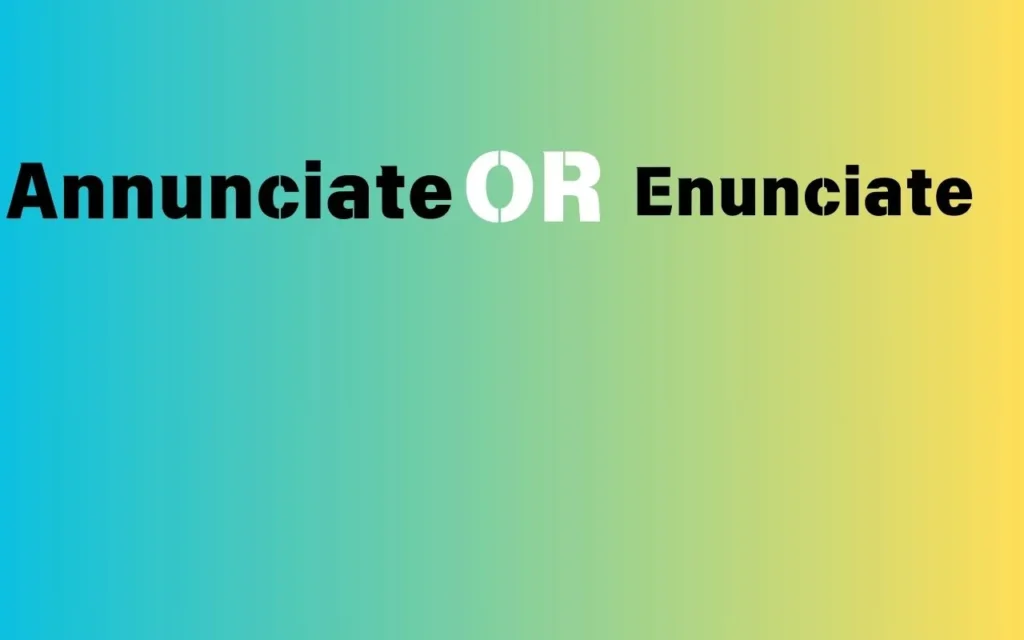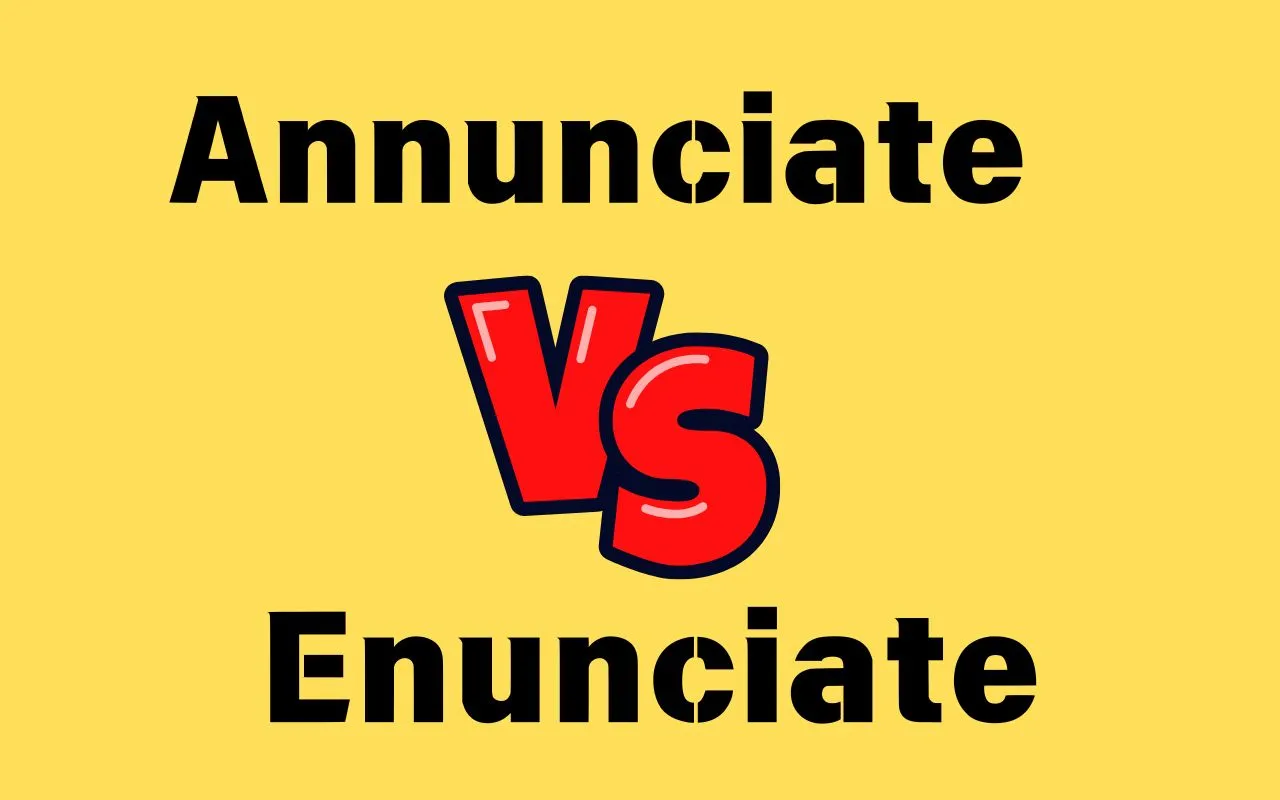Last updated on February 19th, 2025 at 01:39 pm
Language is a powerful tool, and sometimes, seemingly similar words can create confusion. Annunciate and enunciate are perfect examples of this.
While these two words sound alike and are often used interchangeably, they carry distinct meanings and are suited for different contexts.
Is it “annunciate” or “enunciate”? One focuses on proclamations, the other on clear speech. Learn their differences and how to use them confidently!
This article will unravel the mystery behind these terms, explore their origins, and provide practical examples to ensure you never mix them up again.
Exploring the Origins of Annunciate and Enunciate
Both annunciate and enunciate stem from Latin roots, and their meanings are deeply tied to their linguistic heritage.
- Annunciate comes from the Latin word annuntiare, meaning “to announce or proclaim.” It has a ceremonial or formal tone, often linked to significant announcements or religious contexts.
- Enunciate, derived from the Latin enuntiare, translates to “to express clearly or articulate.” It focuses more on speech clarity and pronunciation rather than making proclamations.
Although their roots are similar, their evolution has led to entirely different applications in modern language.
Historical Context and Etymology
Understanding the history of these words helps clarify their nuanced meanings:
Annunciate
- Historical Use: The term annunciate has been traditionally associated with formal or sacred declarations. For example, in Christian theology, the Annunciation refers to the angel Gabriel announcing to Mary that she would give birth to Jesus.
- Etymology: The prefix “an-” strengthens the act of declaring, giving annunciate a weighty, ceremonious implication.
Enunciate
- Historical Use: Enunciate has always been tied to the act of speaking clearly and distinctly. It gained prominence during the 18th and 19th centuries when oratory skills and clear diction became crucial for public speaking and education.
- Etymology: The prefix “e-” focuses on “out” or “forth,” emphasizing bringing words forward with clarity.
The Evolution of Usage Over Time
Language evolves, and so have the meanings and contexts of annunciate and enunciate.
- Annunciate: Historically tied to religious and formal announcements, it is now rarely used in casual conversation. Its use is mostly limited to formal, literary, or ceremonial contexts.
- Enunciate: Over time, enunciate has become widely recognized in educational and professional settings, emphasizing clarity in communication. It’s commonly used in discussions about diction, pronunciation, and effective speaking skills.
These words reflect how language adapts to societal needs—annunciate retains its ceremonial tone, while enunciate has become more practical and applicable to everyday life.
The Definition of Annunciate: More Than Just an Announcement
The word annunciate is a formal verb meaning to proclaim, announce, or declare. It often carries a solemn or ceremonial undertone.
Examples of Annunciate in Context:
- Religious Announcements:
- “The priest annunciate the arrival of the holy season during the mass.”
- Literary Usage:
- “The queen’s herald annunciate the royal decree to the gathered crowd.”
Key Characteristics of Annunciate:
- Used in formal or ceremonial contexts.
- Has a proclamation-like tone.
- Less common in everyday language.
Understanding Enunciate: The Art of Clear Speech
In contrast, enunciate means to articulate words clearly and distinctly. It focuses on the mechanics of speech and is vital for effective communication.
Examples of Enunciate in Context:
- Clear Pronunciation:
- “The actor was praised for enunciating every word in the play.”
- Professional Communication:
- “In her presentation, she enunciated her ideas clearly, ensuring the audience understood every detail.”
Key Characteristics of Enunciate:
- Emphasizes speech clarity.
- Commonly used in education, communication, and professional settings.
- Helps ensure messages are easily understood.
The Importance of Pronunciation and Diction
Both annunciate and enunciate highlight the importance of clear communication, but they do so in different ways:
- Pronunciation: Refers to how words are spoken, focusing on accuracy. Enunciate ensures proper pronunciation.
- Diction: Refers to word choice and how clearly those words are spoken. Proper diction often requires enunciation.
Clear speech improves understanding, fosters connection, and reduces miscommunication. Whether delivering a speech, teaching a class, or engaging in a conversation, enunciation plays a critical role in effective communication.
Enunciation in Professional Settings
In professional environments, clear speech and proper enunciation can significantly impact how others perceive you.
Why Enunciation Matters:
- Improves Communication: Ensures that ideas are understood without ambiguity.
- Enhances Confidence: Well-enunciated speech makes you sound more confident and credible.
- Fosters Connection: Listeners are more likely to engage with someone who speaks clearly.
Practical Tips for Better Enunciation:
- Speak slowly and deliberately.
- Practice tongue twisters to improve articulation.
- Record yourself speaking and identify areas for improvement.
- Focus on vowel and consonant clarity.
Examples of Annunciate Or Enunciate in Sentences

Here are some real-world examples to help differentiate the two words:
| Word | Sentence |
|---|---|
| Annunciate | “The spokesperson annunciate the company’s new policy during the press conference.” |
| Enunciate | “The professor enunciated each word carefully so that the international students could follow along.” |
Annunciate in Action: Context and Clarity
The act of annunciating is most often seen in formal contexts, where announcements carry significant weight.
Examples of Annunciate in Action:
- In a historical context:
“The king annunciate his decision to abolish taxes in a speech to the nation.” - In a religious setting:
“The angel annunciate the birth of the savior.”
In modern times, annunciate is rarely used in casual speech but still holds value in literature and formal discourse.
Enunciate in Everyday Speech: The Key to Clarity
While annunciate is less common, enunciate plays a vital role in daily life. From classrooms to boardrooms, clear speech is a universal necessity.
Everyday Examples of Enunciate:
- Giving directions:
“Please enunciate your words when explaining the route so I don’t get lost.” - Public speaking:
“Great speakers enunciate every word to captivate their audience.”
Mastering enunciation can elevate your communication skills and make interactions smoother.
FAQs
What is the difference between “annunciate” and “enunciate”?
“Annunciate” refers to formal or ceremonial proclamations, while “enunciate” focuses on speaking words clearly and distinctly.
Can “annunciate” be used in everyday speech?
Not usually. “Annunciate” is reserved for formal or literary contexts, such as religious or historical announcements.
Why is enunciation important in communication?
Enunciation ensures clarity, reduces misunderstandings, and enhances confidence in professional and personal interactions.
How can I improve my enunciation?
Practice speaking slowly, use tongue twisters, focus on vowel and consonant clarity, and record yourself to identify areas for improvement.
What are examples of annunciate and enunciate in sentences?
- Annunciate: “The priest annunciate the arrival of the holy season.”
- Enunciate: “She enunciated her words carefully during the presentation.”
Concluding Thoughts on Annunciate vs Enunciate
Though annunciate and enunciate may sound alike, their meanings and applications are entirely different. Annunciate is about formal announcements, while enunciate focuses on clarity in speech.
Understanding these distinctions not only enhances your vocabulary but also sharpens your communication skills. Whether you’re delivering a proclamation or striving for clearer diction, knowing when to use annunciate or enunciate will ensure your message is received loud and clear.
Which of these words have you used incorrectly in the past? Share your thoughts or questions in the comments below!
